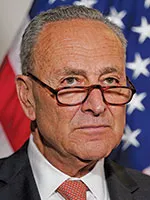Senior Reporter
FY24 Funding Bills to Top Agenda After Recess, Schumer Says

[Stay on top of transportation news: Get TTNews in your inbox.]
Ensuring federal agencies are funded through fiscal 2024 will lead the Senate’s agenda when members return to Washington after the August recess, the chamber’s leader indicated recently.
Majority Leader Chuck Schumer (D-N.Y.) emphasized the seriousness with regard to approving fiscal 2024 funding bills for federal agencies, such as the U.S. Department of Transportation.
“What are we going to do when we come back in September,” said Schumer, speaking with reporters shortly before the August recess. “Well, it’s going to be all hands on deck. First and foremost, we must fund the government. And as I said today, we took an incredible step forward.”
The Senate leader noted the chamber’s funding panel advanced the dozen fiscal 2024 appropriations bills pertaining to federal operations, including policies and programs at DOT. Schumer credited bipartisanship, or as he put it, “This is a divided country. You say our politics are divided, and you had 12 appropriations bills passed in a bipartisan way out of the committee; incredible.”
Sens. Patty Murray (D-Wash.) and Susan Collins (R-Maine), the leaders of the Appropriations Committee, expressed optimism in the ability to advance funding bills prior to the Sept. 30 deadline.
“There’s more to do: we still have to get these bills passed through the full Senate, and House, and signed into law — and that is our focus moving forward. However, what this committee has achieved over the last several weeks shows that it is possible for Congress to work together and work through real differences — to find common ground and produce serious, bipartisan bills that can be signed into law,” Murray and Collins said in a joint statement on July 27.

Schumer
They continued, “There’s simply no reason for chaos or gridlock when it comes to making sure our government is funded. We are determined to deliver investments that will strengthen our economy, keep our country safe, and do some good for the people we all represent back home.”
When policymakers wrap up their August recess after Labor Day, they are tasked with resuming their legislative responsibilities. That will include considering appropriations funding bills. The federal government’s current funding authority is set to expire Oct. 1. To avert a partial government shutdown, Congress needs to clear for the president’s signature its appropriations legislation.
The Senate’s fiscal 2024 transportation funding bill, approved in committee on July 20, would dedicate $98.9 billion for the departments of Transportation and Housing and Urban Development. Specific to transportation agencies, the measure would dedicate $20.2 billion for the Federal Aviation Administration, $16.8 billion for the Federal Transit Administration and $3.4 billion for the Federal Railroad Administration.
The House Appropriations Committee approved its fiscal 2024 transportation bill on July 18. The House bill would dedicate $90.2 billion for the departments of Transportation and Housing and Urban Development. That would include $19.5 billion for the FAA, $14.6 billion for the FTA and $1.4 billion for the FRA.
Both the Senate and House legislative versions would dedicate nearly $1 billion for the Federal Motor Carrier Safety Administration, the agency that oversees trucking rules and regulations.
Want more news? Listen to today's daily briefing above or go here for more info
House Republican leaders intend to avoid a scenario in which funding for federal agencies is disrupted. “I don’t want government to shut down,” Speaker Kevin McCarthy (R-Calif.) told reporters on Capitol Hill before the August recess. “I want to find that we can find common ground. … Let’s get this work done and let’s try to get it done before Sept. 30.”
Transportation Secretary Pete Buttigieg, addressing members of Congress earlier this year, promoted President Joe Biden’s fiscal 2024 budget request. The White House amplified transportation safety, supply chain connectivity and equity. It also would dedicate nearly $1 billion for FMCSA.




